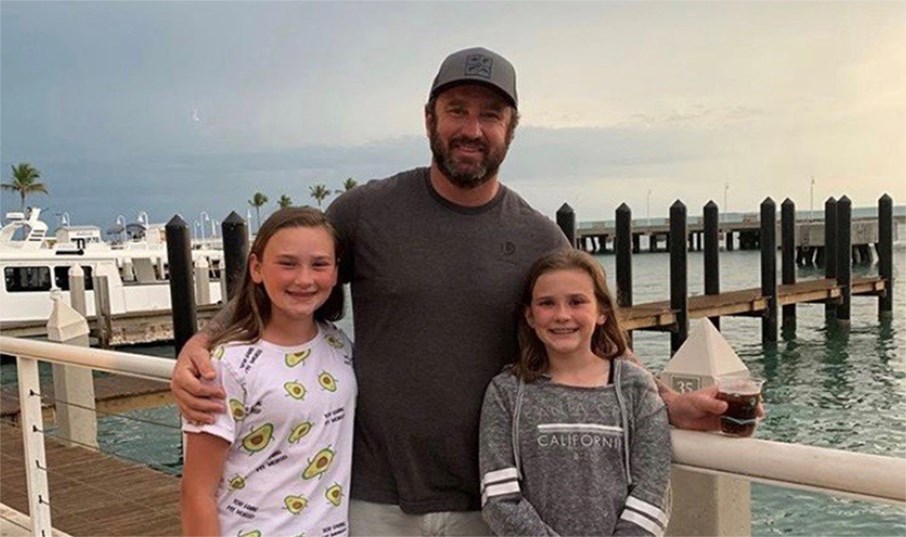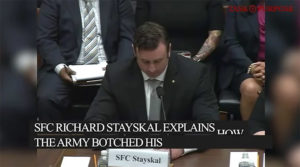“[My daughter] screamed and yelled that she was so happy and proud,” Stayskal said. “I just sat and smiled and pondered on the last year and everything that has been.
“It was just an overwhelming feeling of relief.”
Stayskal, 38, a Green Beret based at Ft. Bragg, North Carolina, is living with terminal lung cancer. After military doctors failed to diagnose his illness in 2017, he found out that not only was it terminal, but also a 70-year-old Supreme Court ruling blocked him from suing the military.
In 2018, as NBC Nightly News detailed in November, Stayskal began fighting to hold the military accountable with the help of his lawyer Natalie Khawam and Rep. Jackie Speier, D-Calif., chair of the House Armed Services Committee’s Military Personnel Subcommittee.
Making the 330-mile drive from Ft. Bragg at least once a month, he and his wife, Megan, visited Washington again and again, meeting with members of Congress and testifying in support of a change in the law that would let service members get financial compensation from the military for medical mistakes.
On Friday evening, President Donald Trump signed the National Defense Authorization Act (NDAA), which includes a provision — inspired by Stayskal’s lobbying — that will allow service members, for the first time, to file claims against the military for alleged medical malpractice in military facilities. The Congressional Budget Office estimates it will cost $400 million over 10 years to cover the claims.
Stayskal said learning of the success of what began as the SFC Richard Stayskal Military Medical Accountability Act of 2019 made him think about his family — and about his fellow service members. “I think about them all the time, and they’ve been a part of me for this journey,” he said. “I’ve won this for all of us.”
“I want them to know that it’s there to protect them,” he said. “To know that their families are protected. It should be a good feeling that we’re being thought of and included.“
Speier credited the “victory” to Stayskal, and said that thanks to him the bill had made it through Congress in what, for Washington, was record time.
“It typically takes 10 to 12 years for a measure like this,” she said. “I cannot underscore enough how remarkable this achievement is. For a bill of this nature, of this complication, of this kind of a price tag, to get through in the matter of a year is nothing short of a miracle.“
“Richard and his wife, Megan, made an incredibly compelling case for why we needed to change. And his fortitude really made an amazing difference.”
The CT scan
Stayskal had survived being shot by an Iraqi sniper during a deployment to the Middle East in 2004. In January 2017, during a physical at Ft. Bragg to qualify for a diving course, he got a required CT scan at a military hospital. Doctors working for the military missed a tumor on his lung.
By June, Stayskal was coughing up blood and obtained special permission to go off the military base to see a civilian specialist. Dr. Michael Pritchett, a pulmonologist, gave Stayskal his first accurate diagnosis: Lung cancer. Stage 3.
By then, the tumor had nearly doubled in size.
“The fact that he went six months without a diagnosis allowed that cancer to grow and very likely advanced its stage,” Pritchett told NBC News.
But he couldn’t hold the military’s doctors accountable in court. A 1950 Supreme Court ruling followed by decades of case law known as the Feres Doctrine prevents active-duty service members from suing the federal government for medical malpractice. For years, the doctrine has survived one legal challenge after another, effectively preventing military families from seeking redress in the courts.
Stayskal began his campaign to circumvent the Feres Doctrine in 2018 after meeting lawyer Khawam, from the Whistleblower Law Firm in Tampa, Florida. “I didn’t want to be another statistic and go to the Supreme Court and be dismissed,” Khawam said. “I knew Congress was the best route, it was also the most impossible route.”
In late 2018, they met with Speier. In April, she called a hearing and introduced the bill named after him, also known as H.R. 2422.
The Stayskals and Khawam stepped up their meetings with lawmakers. “We were told that some people don’t support this, or it was not something we could achieve in a year, and we just continued to silence those comments and commit ourselves to the cause, in hopes of the right thing would occur,” Khawam said.
On Dec. 10, Stayskal was in North Carolina with his family when he got the call telling him the claims process had become part of the final NDAA bill.
“It was glorious, yet very emotional,” Khawam said. “It’s been Christmas every day since then.“
When the NDAA passed the House on Dec. 11 and Senate on Dec. 17, Stayskal was at the Capitol to witness both votes.
When the president signs the law Friday, it won’t overturn the Feres Doctrine, and it doesn’t allow service members to sue the Defense Department. It does, however, create a way for them to hold military medical facilities accountable.
Through the new claims process, service members with successful claims are eligible for monetary compensation. There is no cap on the amount they can receive.
The law also forces the Defense Department to document and respond to such claims, and provides for congressional oversight of the DOD’s administration of the claims process so it can be improved in future years.
it is also retroactive to the beginning of 2017 — just before Stayskal’s fateful visit to a military hospital — meaning Stayskal and his family can file a claim.
“It’s been a long journey,” he said, “but I think it’s finally starting to sink in.”
Original Article:
https://www.nbcnews.com/health/cancer/servicemembers-will-soon-be-able-file-claims-against-military-medical-n1104561

 Call Now- Open 24/7
Call Now- Open 24/7





